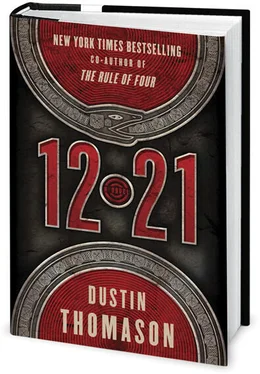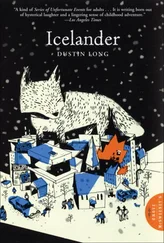Shetter had shoulder-length brown hair and several days of unkempt beard growth creeping up his cheeks toward the bottom of his eye shield. He wore a starched white shirt, a tie, black jeans, and shiny boots. With how tall he was, it added up to a strangely attractive combination. He had to be six-foot-six at least.
“Nice to meet you,” Chel said.
“What’s your specialty, Dr. Manu?” Shetter asked. He had a deep voice with a light southern accent. Florida, Chel guessed.
“Epigraphy,” she told him. “Do you work in the discipline?”
“I dabble a bit, I guess.”
“Is that how you two know each other?”
“I worked for ten years in the Petén,” he said.
“Doing what?”
He glanced at Victor. “Training the Guatemalan army.”
Those were words no indígena wanted to hear. Whatever appeal he had a moment before was gone. “Training them for what?” she asked.
“Urban combat and counterterrorism, mostly.”
“You’re with the CIA?”
“No, ma’am, nothing like that. Army Rangers showing the Guatemalans how to modernize their operation.”
Any help the U.S. government gave to the Guatemalan army was too much for Chel. In the fifties, the CIA had been responsible for bringing down the democratically elected government in order to install a puppet dictatorship. Many indígenas blamed them for instigating the civil war that had taken her father’s life.
“Colton is a great admirer of the indígenas, ” Victor said.
“I spent my leave time in Chajul and Nebaj with the villagers,” Shetter said. “Amazing people. They took me to the ruins at Tikal, and that’s where I met Victor.”
“But you live in Los Angeles now?”
“Sort of. Got a little cottage way up in the Verdugo Mountains.”
Chel had hiked up in the Verdugos a few times but remembered it mostly as a wildlife preserve. “People live up there?” she asked.
“A lucky few of us do,” said Shetter. “Reminds me of your highlands, actually. Speaking of which, I should be getting home.” He turned to Victor and pointed at his eye shield. “Keep that on. Please.”
“Thanks for coming by, Colton.”
Seconds later, the giant man was gone.
“What’s his deal?” Chel asked when she was alone with Victor.
Victor shrugged. “Oh, Colton simply has a lot of experience in dangerous situations. He’s out trying to make sure his friends are protecting themselves in these perilous times.”
“He’s right. This is serious.”
Chel studied Victor, searching for clues to his mental state. But if there was any sign of tension or pain, she didn’t see it.
“Yes, I know,” Victor said. “So… how’s Patrick doing in all this?”
“We’re not seeing each other anymore.”
“That’s too bad,” Victor said. “I liked him. And I suppose that means I am further and further away from godchildren.”
Victor’s old affection for her felt good, even after all they’d been through. “You should write your next book on the virtues of a one-track mind,” she told him.
He smiled. “Never mind that, then,” he said. He motioned for her to follow him. “I’m glad you’re here. You can finally see my exhibit.”
They doubled back into a dark gallery where the exhibit was being staged. It was still under construction, but a glass case covering the back wall was illuminated, and Chel walked toward the light, fearful of what she might find. Inside the case were four statues of men, each two feet tall, each constructed from a different material connected to Maya history: the first from chicken bones, the second out of dirt, the third from wood, and the last from kernels of corn. According to the Maya creation myth, there were three unsuccessful attempts by the gods to create mankind. The first race of men was made from the animals themselves, but they could not speak. The second was made from mud but could not walk, and the third race of men, made from wood, could not keep a proper calendar or worship their makers by name. It wasn’t until the fourth race of men, fashioned out of corn, that the gods were satisfied.
Studying the glass case, Chel noticed something. What was perhaps most interesting, and to her encouraging about Victor’s exhibit, was what he had chosen not to represent here: the fi fth race of man. “So,” her mentor asked. “To what do I owe this great pleasure?”
* * *
CHEL COULDN’T HELP feeling that Victor Granning’s life had come to mirror the civilization to which he’d devoted his career: rise, fluorescence, collapse. By the time he was finished with graduate school at Harvard, he’d made breakthroughs on the use of syntax and grammar in ancient Maya writing. His academic books were celebrated and eventually made their way into the mainstream when The New York Times lauded him as the preeminent Mayanist in the world. After conquering the Ivy League, Victor migrated west to take the chair of UCLA’s department of Maya studies, where he helped launch the careers of many of the field’s next generation of scholars.
Including Chel. When she began her program at UCLA, Victor became her tutor. Chel could decipher glyphs faster than anyone in the department, even as a first-year. Victor taught her everything he knew about the ancient script. Soon she was more than just another of his mentees. Chel and her mother often spent holidays with Victor and his wife, Rose, at their clapboard house in Cheviot Hills. Chel’s first calls when she made tenure, and when she was appointed to the Getty, were to Victor. In the fifteen years since they’d met, he had been a constant source of encouragement, amusement, and, most recently, heartache.
Victor’s own collapse began in 2008, when Rose was diagnosed with stomach cancer. Spending every possible moment by her side, Victor began to search for answers. He couldn’t imagine life without Rose, and he became obsessed with Judaism in a way he hadn’t before: going to temple every day, keeping kosher and the Sabbath, wearing a yarmulke. But when Rose succumbed a year later, Victor turned against the religion; a God that had allowed her to suffer, he felt, couldn’t exist. If there was a higher power, it had to be something else entirely.
It was over the next nine months of mourning that Victor began to theorize about December 21, 2012. Undergraduates began buzzing about some offhand comments he’d made in class about the significance of the end of the Long Count cycle. At first, his students were fascinated, but they grew increasingly less attentive when Victor began using questionable sources that made unsubstantiated claims about Maya beliefs. Lecture time in linguistics classes was spent on the end of the thirteenth cycle and how some believed it would usher in a new era of mankind and a return to a simpler, more ascetic way of life. This was when a few students began to casually mention Victor’s classroom eccentricities to Chel. But at the time she didn’t yet realize how far off track he’d gone. Soon his lectures became diatribes about how cancer was caused by processed foods and how it was proof that humans needed to return to a more basic mode of living. Increasingly fearful of technology, he stopped using email for class-related information, forcing his students to come to office hours instead. Then he told them not to go on the Internet or drive cars and about how the Long Count would bring what the 2012ers called synchronicity —a consciousness of how all things in the world connected—leading to a spiritual renaissance. Chel tried to talk to him about other things, but every conversation veered quickly back to the absurd, and eventually she was at a loss for how to deal with it.
When Victor’s name showed up as the keynote speaker at the largest New Age convention in the country, and the press materials touted his UCLA connection, the administration reprimanded him. Then, in mid 2010, as June gloom shrouded the UCLA campus in mist, Victor called Chel at the Getty and asked her to come in to his office. There, he handed her a manually typed manuscript he’d been working on secretly for months. In large block letters, the title page read: Timewave 2012 .
Читать дальше












